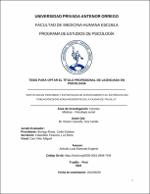| dc.contributor.advisor | Arévalo Luna, Edmundo Eugenio | |
| dc.contributor.author | Rosero Cascante, Ana Camila | |
| dc.creator | Rosero Cascante, Ana Camila | |
| dc.date.accessioned | 2022-08-19T01:19:51Z | |
| dc.date.available | 2022-08-19T01:19:51Z | |
| dc.date.issued | 2022 | |
| dc.identifier.uri | https://hdl.handle.net/20.500.12759/9326 | |
| dc.description.abstract | Esta investigación, tuvo como finalidad determinar la relación entre el apoyo social percibido y las
estrategias de afrontamiento al estrés en una población desplazada residente en la ciudad de
Trujillo. La muestra estuvo conformada por 371 sujetos entre hombres y mujeres, todos de
nacionalidad venezolana, cuyas edades oscilan entre 18 a 60 años. Los instrumentos utilizados
fueron el Inventario de Respuestas de Afrontamiento para Adultos de Moos, y la Escala
Multidimensional de Apoyo Social Percibido de Zimet. Los hallazgos más significativos son: En
cuanto al nivel de apoyo social percibido predominan los rangos medio y alto en un 37,7% y 37,5%
respectivamente; especialmente a nivel de amigos y familia. En cuanto a las estrategias de
afrontamiento, predominan los rangos medio y encima del promedio; es decir, se caracterizan por
poseer un análisis lógico, desarrollan una reevaluación positiva, tienden a buscar guía y soporte; se
mueven en procura de solucionar sus problemas; asimismo, manifiestan aceptación o resignación,
y buscan recompensas y descarga emocional. Finalmente, en el análisis correlacional se ha
demostrado que ambas variables se asocian de manera significativa, el apoyo social percibido con
la reevaluación positiva, búsqueda de guía y búsqueda de recompensas; asimismo, hay relación
significativa con la resolución de problemas, la evitación cognitiva y la descarga emocional; no
así, con el análisis lógico y la aceptación o resignación, donde la relación es insignificante. | es_PE |
| dc.description.abstract | The purpose of this research was to determine the relationship between perceived social support
and stress coping strategies in a displaced population living in the city of Trujillo. The sample
consisted of 371 subjects between men and women, all of Venezuelan nationality, whose ages
range from 18 to 60 years. The instruments used were the Moos Coping Responses Inventory
for Adults, and the Zimet Multidimensional Scale of Perceived Social Support. The most
significant findings are: Regarding the level of perceived social support, the medium and high
levels predominate in 37.7% and 37.5% respectively; especially at the level of friends and
family. Regarding coping strategies, in the different factors evaluated by the scale, the medium
and above-average ranges predominate; that is, they are characterized by having a logical
analysis, they develop a positive reassessment, they tend to seek guidance and support; they
move in search of solving their problems; likewise, they express acceptance or resignation, and
seek rewards and emotional discharge. Finally, the correlational analysis has shown that both
variables are significantly associated, perceived social support with positive reappraisal, search
for guidance and search for rewards; likewise, there is a significant relationship with problem
solving, cognitive avoidance and emotional discharge; not so, with logical analysis and
acceptance or resignation, where the relationship is insignificant. | en_US |
| dc.description.uri | Tesis | es_PE |
| dc.format | application/pdf | es_PE |
| dc.language.iso | spa | es_PE |
| dc.publisher | Universidad Privada Antenor Orrego | es_PE |
| dc.relation.ispartofseries | T_PSICO_325 | |
| dc.rights | info:eu-repo/semantics/openAccess | es_PE |
| dc.rights.uri | https://creativecommons.org/licenses/by/4.0/ | es_PE |
| dc.source | Universidad Privada Antenor Orrego | es_PE |
| dc.source | Repositorio Institucional - UPAO | es_PE |
| dc.subject | Estrategias de Afrontamiento | es_PE |
| dc.subject | Apoyo Social | es_PE |
| dc.title | Apoyo social percibido y estrategias de afrontamiento al estrés en una población desplazada residente en la ciudad de Trujillo | es_PE |
| dc.type | info:eu-repo/semantics/bachelorThesis | es_PE |
| thesis.degree.level | Título Profesional | es_PE |
| thesis.degree.grantor | Universidad Privada Antenor Orrego. Facultad de Medicina Humana | es_PE |
| thesis.degree.name | Licenciado en Psicología | es_PE |
| thesis.degree.discipline | Psicología | es_PE |
| dc.subject.ocde | https://purl.org/pe-repo/ocde/ford#5.01.00 | es_PE |
| renati.advisor.orcid | https://orcid.org/0000-0001-8948-7449 | es_PE |
| renati.author.dni | 01320192 | |
| renati.advisor.dni | 10472445 | |
| renati.type | https://purl.org/pe-repo/renati/type#tesis | es_PE |
| renati.level | https://purl.org/pe-repo/renati/level#tituloProfesional | es_PE |
| renati.discipline | 313016 | es_PE |
| renati.juror | Borrego Rosas, Carlos Esteban | |
| renati.juror | Cabanillas Tarazona, Luz Elena | |
| renati.juror | Caro Vela, Miguel | |
| dc.publisher.country | PE | es_PE |


